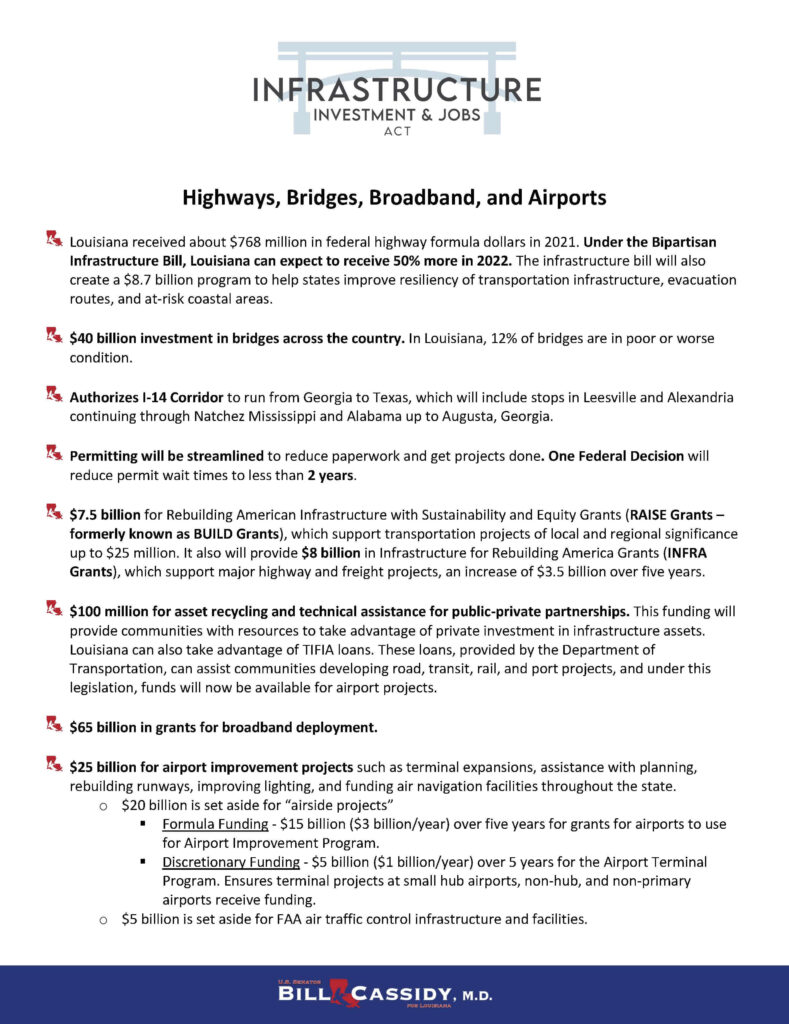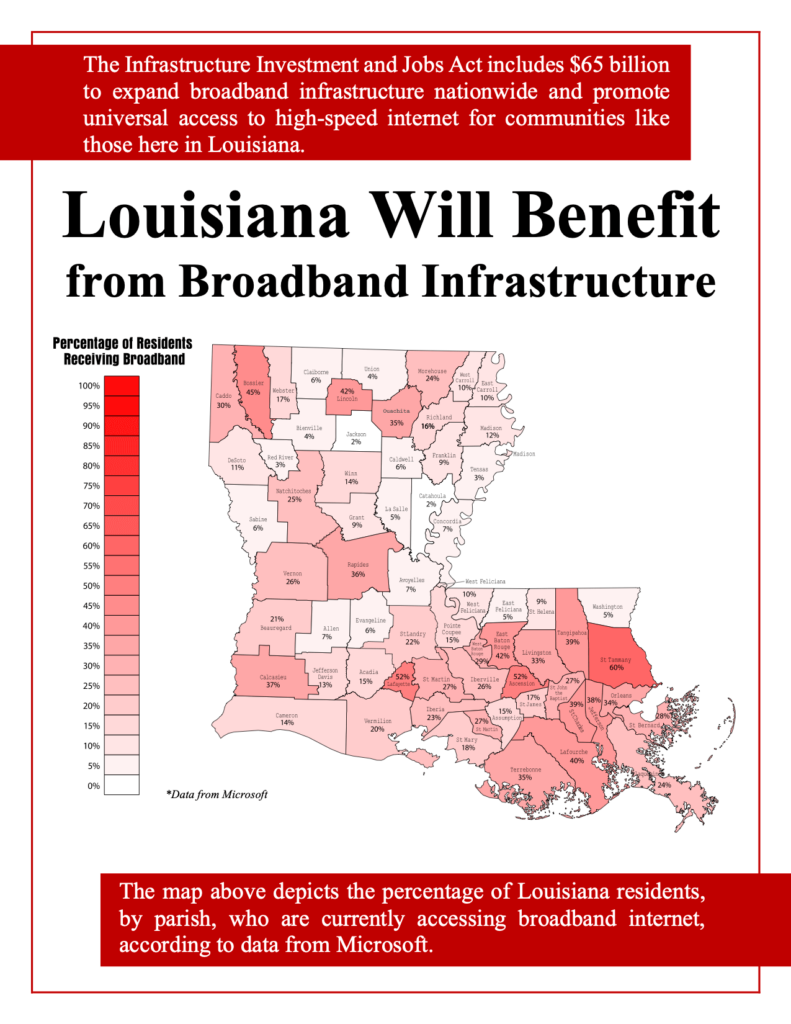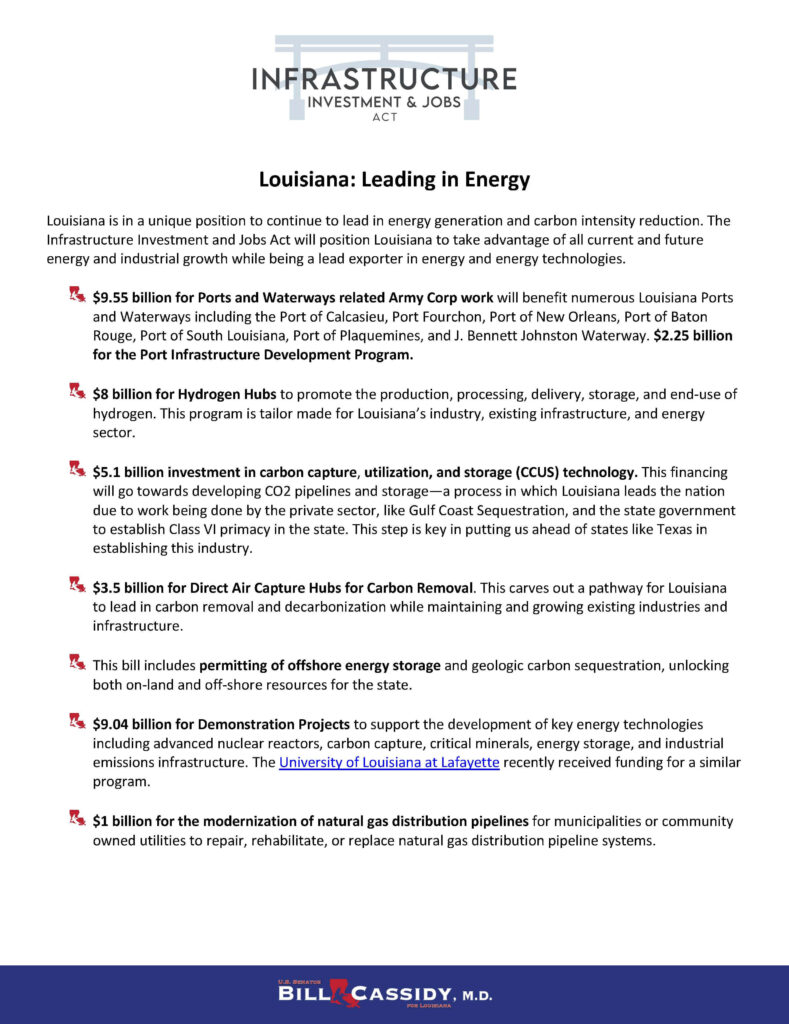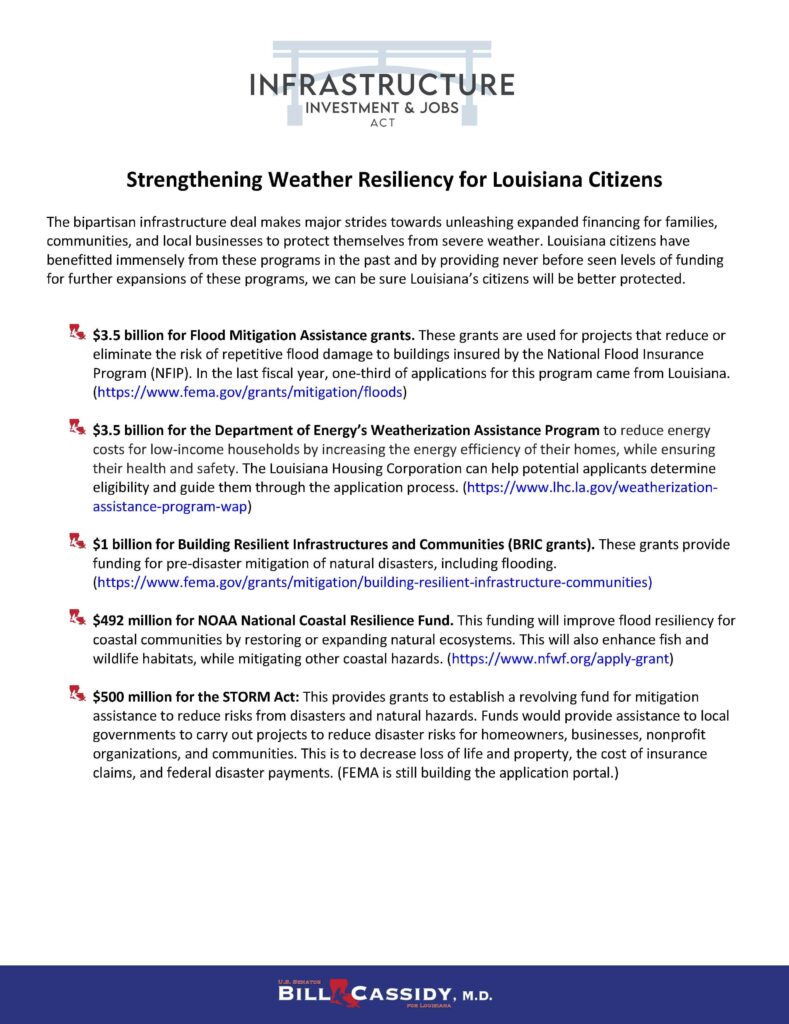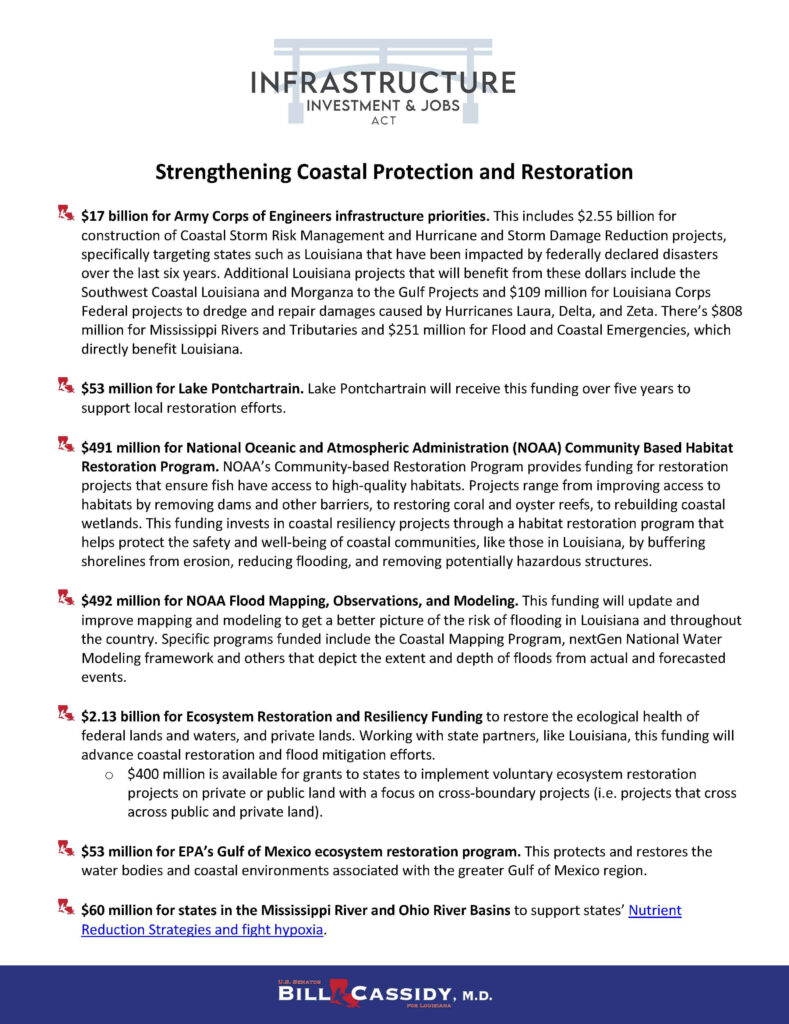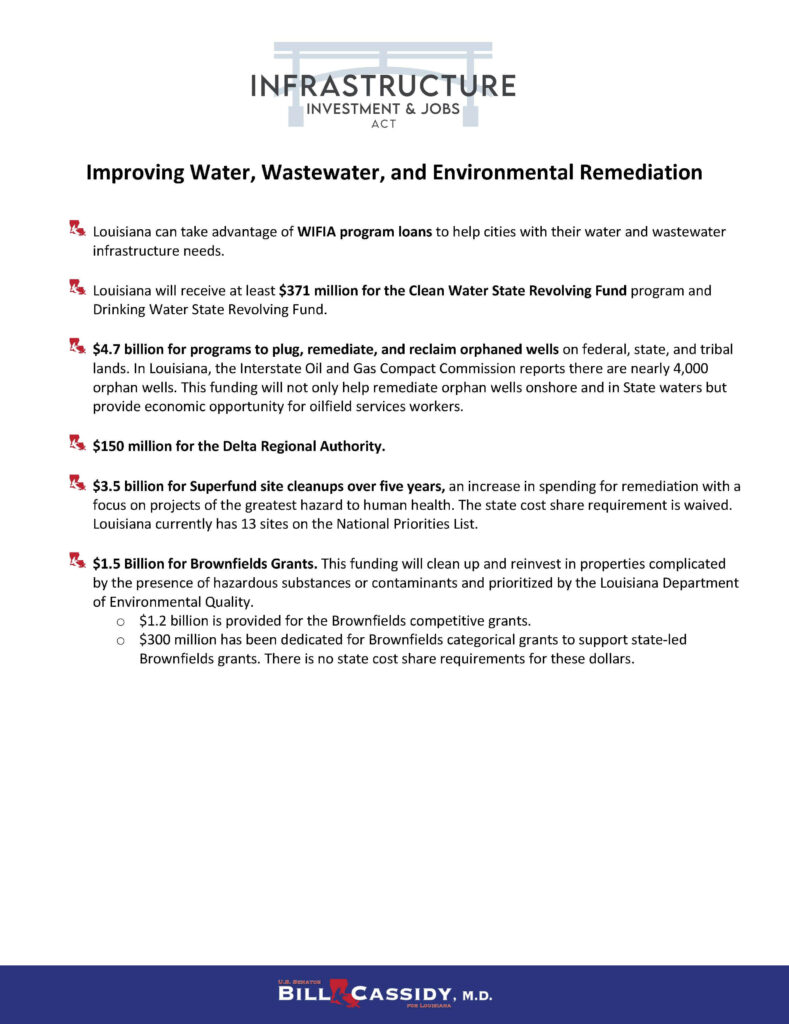Current IIJA Funds for Louisiana = $10 Billion
U.S. Senator Bill Cassidy, M.D. (R-LA) released the following statement after the U.S. House of Representatives passed the historic bipartisan Infrastructure Investment and Jobs Act (IIJA) in a bipartisan stand-alone vote separate from Democrats’ tax and spending spree:
“This is a major victory for Louisiana and our nation. This infrastructure package will rebuild our roads and bridges, increase access to high-speed internet, strengthen our electric grid, add levee protection, and improve flood resiliency. After almost every corner of our state was hit by natural disasters in the last year, we must have the federal investment to protect us from future storms,” said Dr. Cassidy. “This bipartisan bill is the right way to reinvest in our country, unlike Democrats reckless tax-and-spending spree, which I continue to strongly oppose.”
Cassidy was a lead author and vocal champion of IIJA. Cassidy was part of the original bipartisan group of senators, members of Congress, and governors who met in Annapolis last April to discuss a bipartisan path forward on infrastructure. He later worked closely with a group of 10 senators, five Republicans and five Democrats, to craft the bipartisan bill.
The U.S. Senate overwhelmingly passed IIJA by a vote of 69-30 in August.
Louisiana will benefit from the hundreds of billions to rebuild America’s transportation infrastructure, including $110 billion for roads and bridges. The Infrastructure Investment and Jobs Act includes $46 billion for resiliency that will go in part to rebuild Louisiana’s eroded coastlines and waterways and $65 billion to bolster American energy and strengthen the electrical grid from disaster. The bill will also invest $65 billion in broadband to expand internet access to tens of thousands of Louisianans who currently do not have access.
IIJA will help Louisiana become more resilient to disasters after Hurricane Ida with funding for critical evacuation routes included with nearly $6 billion over the next five years for roads and bridges in our state. The legislation includes $26 billion specifically to strengthen our nation’s electrical grid to prevent widespread power outages like those that occurred during Hurricane Ida. This includes $5 billion directed at enhancing the resilience of electric grids from extreme weather and natural disasters, $12.5 billion to increase power transmission to maintain reliable access to energy, and $9 billion to develop and deploy new technology to strengthen grid reliability and resiliency. Of the $17 billion for the Army Corps of Engineers in this bill, $2.55 billion is specifically for Coastal Storm Risk Management and Hurricane and Storm Damage Reduction projects targeting states such as Louisiana that have been impacted by federally declared disasters over the last six years. There is another $5.5 billion in disaster mitigation, coastal restoration and flood mitigation assistance.
Cassidy secured the inclusion of the following provisions to benefit Louisiana:
- Authorizes I-14 corridor: This highway will run from Georgia to Texas, which will include stops in Leesville and Alexandria continuing through Natchez, Mississippi and Alabama up to Augusta, Georgia.
- Eliminates federal red-tape by reforming the permitting process to speed construction projects: Builds on the Federal Permitting Council’s efforts to shorten the government approval process for large infrastructure projects by bringing relevant agencies together to reduce inefficiencies.
- $40 Billion for bridges: As a state, Louisiana has the third most bridge deck area in poor condition. This funding will rebuild Louisiana’s bridges, many of which are rated as poor or structurally deficient.
- Invests in Louisiana’s Airports: The bill includes $25 billion for airport improvement projects such as expansions, installations, assisting with planning, rebuilding runways, improving lighting, and air navigation facilities throughout the state.
- $9.55 Billion for Ports and Waterways: This will benefit numerous Louisiana Ports and Waterways such as the Port of Calcasieu, Port Fourchon, Port of New Orleans, Port of Baton Rouge, Port of South Louisiana, Port of Plaquemines, and J. Bennett Johnston Waterway.
- $3.2 Billion for the Infrastructure for Rebuilding America Grant Program: This program supports crucial highway and rail projects.
- $65 Billion for Broadband: This funding will expand internet access to Louisiana’s rural and low-income communities.
- $500 Million for the STORM Act: This provides grants to establish a revolving fund for mitigation assistance to reduce risks from disasters and natural hazards. Such funds would provide assistance to local governments in States, including Louisiana, for projects to reduce disaster risks to homeowners, businesses, nonprofit organizations, and communities to decrease the loss of life and property, the cost of insurance claims, and federal disaster payments.
- $7.5 Billion for Rebuilding American Infrastructure with Sustainability and Equity Grants: These grants support transportation projects of local and regional significance.
- $3.5 Billion for Flood Mitigation Assistance grants: These grants are used for projects that reduce or eliminate the risk of repetitive flood damage to buildings insured by the National Flood Insurance Program (NFIP). In the last fiscal year, one-third of applications for this program came from Louisiana.
- $17 Billion for Army Corps of Engineers infrastructure priorities: This includes $2.55 billion for construction of Coastal Storm Risk Management and Hurricane and Storm Damage Reduction projects specifically targeting states such as Louisiana that have been impacted by federally declared disasters over the last six years. Additional Louisiana projects that will benefit from these dollars include the Southwest Coastal Louisiana and Morganza to the Gulf Projects. There’s $109 million for Louisiana Corps Federal projects to dredge and repair damages caused by Hurricanes Laura, Delta, and Zeta, $808 million for Mississippi Rivers and Tributaries, and $251 million for Flood and Coastal Emergencies, which directly benefit Louisiana.
- $53 Million for Lake Pontchartrain: Lake Pontchartrain will receive this funding over five years to support local restoration efforts.
- $2.25 Billion for the Port Infrastructure Development Program: This grant program provides funding to improve port facilities, a top priority for Louisiana ports.
- $491 Million for National Oceanic and Atmospheric Administration (NOAA) Community Based Restoration Program: This funding invests in coastal resiliency projects through a habitat restoration program that helps protect the safety and well-being of coastal communities, like those in Louisiana, by buffering shorelines from erosion, reducing flooding, and removing potentially hazardous structures.
- $492 Million for NOAA National Coastal Resilience Fund: This funding will improve the resilience of coastal communities to flooding by restoring or expanding natural ecosystems while enhancing fish and wildlife habitats and increasing protection for communities from coastal hazards.
- $492 Million for NOAA Flood Mapping, Observations, and Modeling: This funding will update and improve mapping and modeling to get a better picture of the risk of flooding in Louisiana and throughout the country.
- $150 Million for the Delta Regional Authority.
- $1 Billion for Building Resilient Infrastructures and Communities grants: These grants provide funding for pre-disaster mitigation funding for natural disasters including flooding.
- $5.1 Billion for the SCALE Act: This is the largest government investment in carbon capture, utilization, and storage (CCUS) technology. It includes $2.1 billion for a CO2 loan program to provide flexible, low-interest loans for CO2 transport infrastructure projects and grants for initial excess capacity on new infrastructure to facilitate future growth; $2.5 billion to expand the DOE’s Carbon Storage Validation and Testing program to include large-scale commercialization of new or expanded carbon sequestration projects; $300 million in grants to procure and use products derived from captured carbon oxides; $100 million for front-end engineering and design for carbon dioxide transport infrastructure; and $75 million for states to establish Class VI permitting programs to ensure rigorous and expedited CO2 geologic storage site permitting
- $3.5 Billion for weatherization grants for low-income people and communities.
- $4.67 Billion for orphan well remediation.
- $53 Million for Gulf of Mexico ecosystem restoration.
- $60 Million for States in the Mississippi River and Ohio River Basins to support states’ Nutrient Reduction Strategies and fight hypoxia.
- Expansion of the Outer Continental Shelf Lands Act to permit offshore energy storage. This provides flexibility to develop energy storage in in future energy development off-shore in the Gulf of Mexico.
- Cleaning Up Contaminated Sites: This bill provides $3.5 billion for cleanup at Superfund sites an increase in spending for remediation with a focus on projects of the greatest hazard to human health. Louisiana currently has 13 sites on the National Priorities List.
- $1.5 Billion for Brownfields Grants: This funding will clean up and reinvest in properties complicated by the presence of hazardous substances or contaminants and prioritized by the Louisiana Department of Environmental Quality.
- $8 Billion for Hydrogen Hubs: This creates regional clean hydrogen hubs to demonstrate the production, processing, delivery, storage, and end-use of clean hydrogen. This program is tailor made for Louisiana’s industry, existing infrastructure, and energy sector.
- Geologic Carbon Sequestration on the Outer Continental Shelf: This allows the U.S. Department of the Interior to permit geologic carbon sequestration on the outer Continental Shelf and will unlock new industries for Louisiana and ensuring the ability to store carbon dioxide.
- $9.04 Billion for Demonstration Projects to support the development of key energy technologies including advanced nuclear reactors, carbon capture, critical minerals, energy storage, and industrial emissions infrastructure. The University of Louisiana at Lafayette recently received funding for a hydrogen technology program.
- $6 Billion for the Civil Nuclear Credit Program: This section provides the U.S. Department of Energy with the authority, in consultation with the heads of applicable Federal agencies, to establish a process to evaluate bids through an auction process and select certified nuclear reactors to be allocated credits. This ensures vital existing nuclear sources like those in Louisiana are kept online and provide reliable, resilient, and clean energy.
- $3.5 Billion for Direct Air Capture Hubs for Carbon Removal: Develops regional direct air capture hubs to aid the capture of carbon dioxide from the atmosphere. This carves out a pathway for Louisiana to lead in carbon removal and decarbonization while maintaining and growing existing industries and infrastructure.
- $2.13 Billion for Ecosystem Restoration and Resiliency Funding to restore the ecological health of Federal lands and waters and private lands. Working with state partners, like Louisiana, this funding will advance coastal restoration and flood mitigation efforts.
Myth vs Fact
Get some misconceptions cleared up with our fact sheet.
Download IIJA Myth vs. Fact PDF
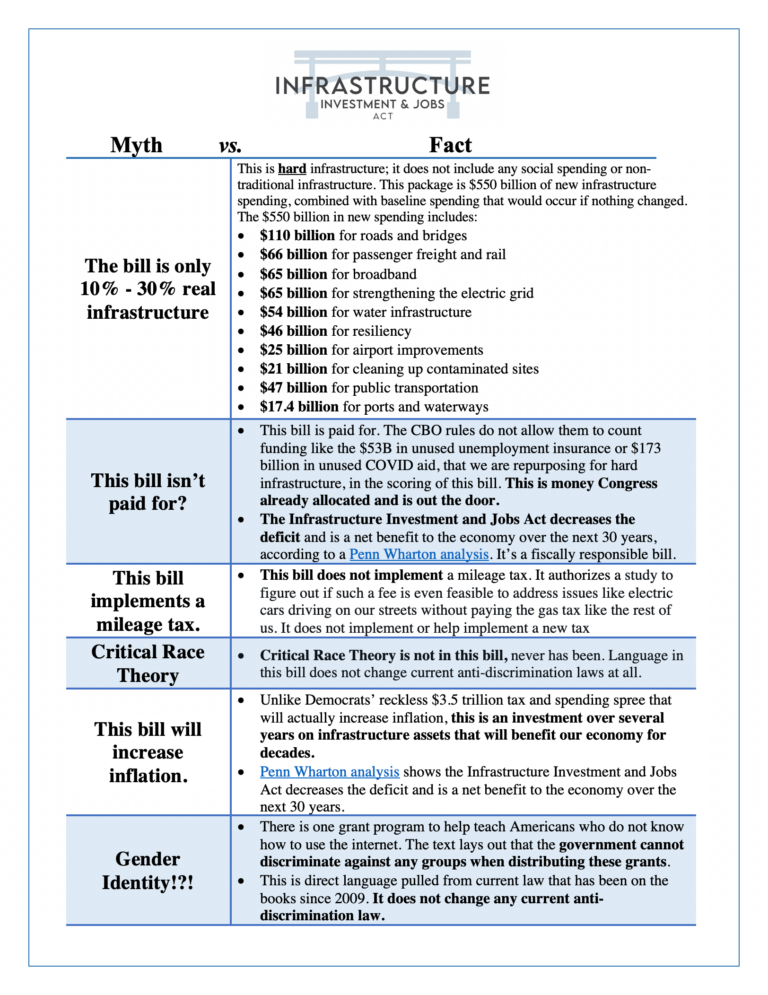
Louisiana Benefits
Download PDF OF All One-Pagers
Rebuilding and Expanding Louisiana Highways, Bridges, Broadband and Airports
LA Broadbrand Map
Bolstering Louisiana Energy
Strengthening Louisiana Weather Resiliency
Improving Louisiana Coastal Protection and Restoration
Upgrading Louisiana Water, Wastewater, and Environmental Remediation
Support for IIJA
BRAC thanks @SenBillCassidy for his incredible leadership to get a bipartisan infrastructure bill passed through the US Senate this week. Baton Rouge desperately needs more investment in roads and a new bridge. Cassidy played a huge role to help get it done.
Baton Rouge Round Table (BRAC)
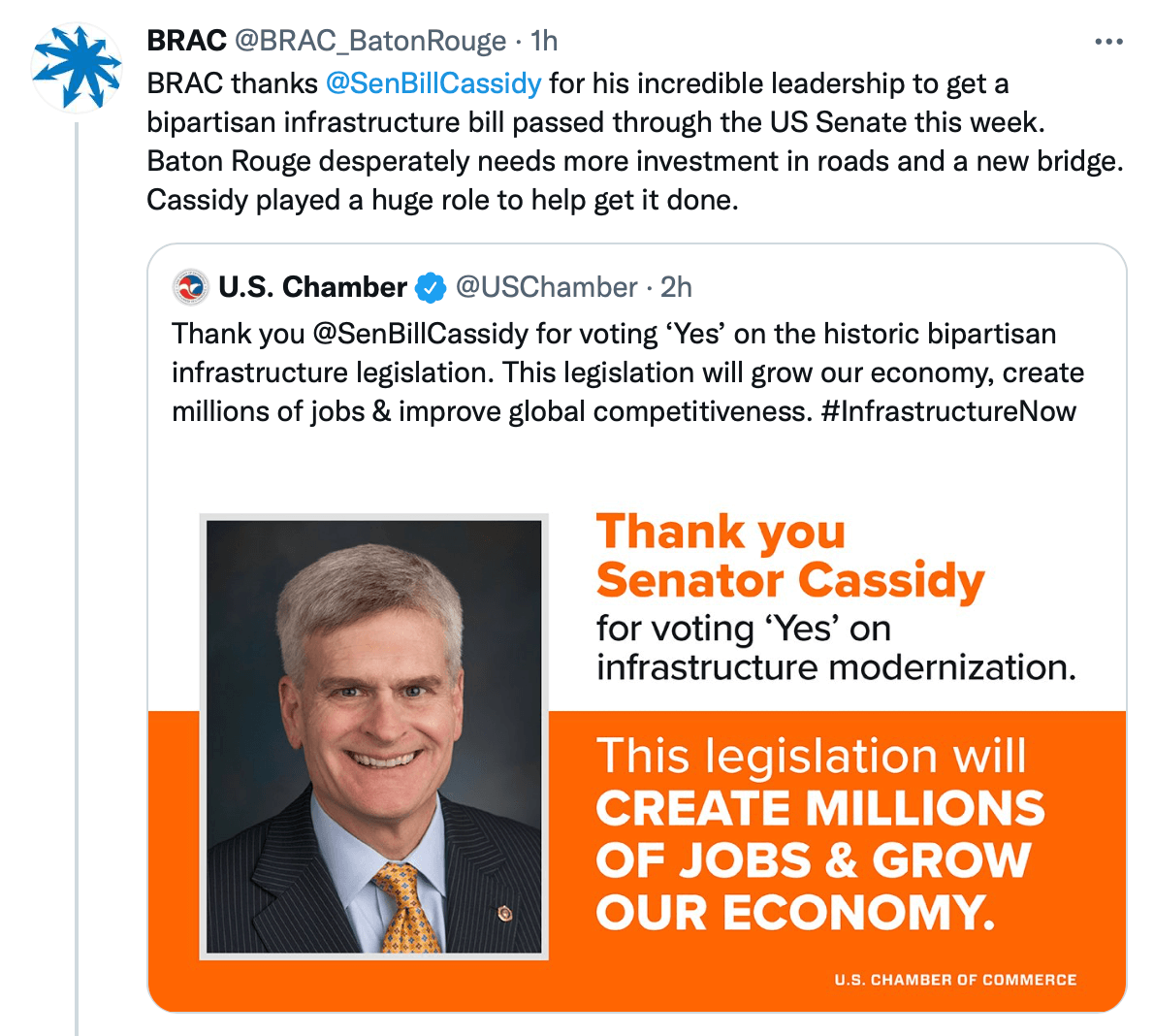
@SenBillCassidy, thank you for supporting all Americans and the U.S. economy by voting yes on the Infrastructure Investment and Jobs Act. #IIJA
Business Roundtable

Thank you @SenBillCassidy for voting ‘Yes’ on the historic bipartisan infrastructure legislation. This legislation will grow our economy, create millions of jobs & improve global competitiveness. #InfrastructureNow
U.S. Chamber of Commerce

“One of the key authors of the ports section, @SenBillCassidy was on the floor moments ago touting the importance of projects that would be funded by this legislation. Read more about the need for infrastructure upgrades in Louisiana in the Advocate.”
American Association of Port Authorities
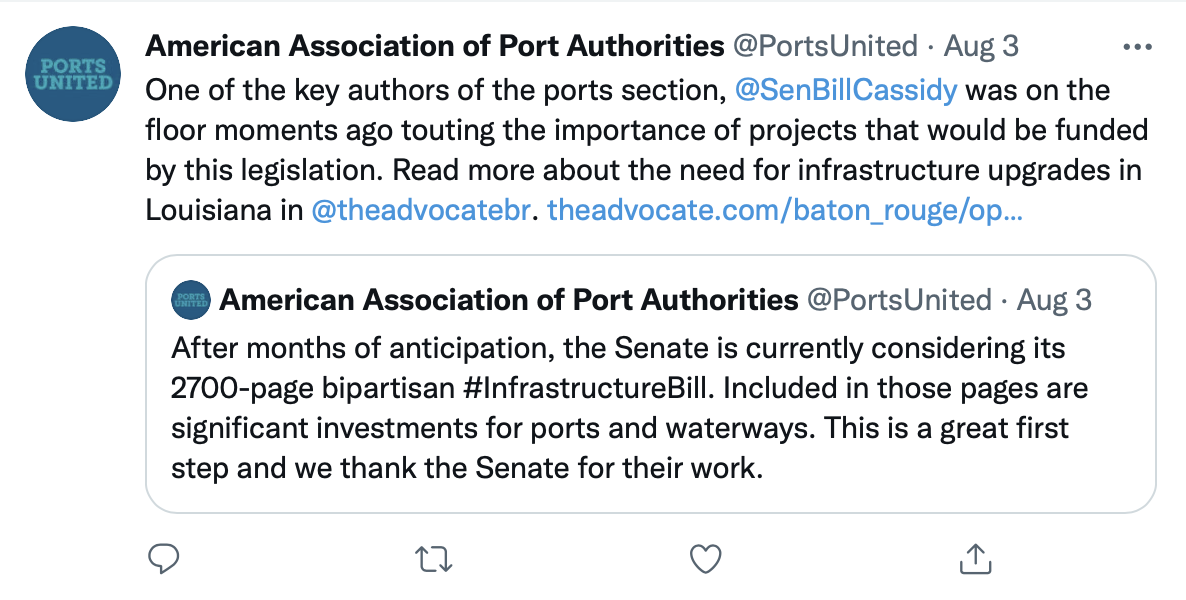
“If you get coastal permitting down to 2 years with the army Corp of engineers that is worth all the tea in China.”
Speaker Pro Tempore of the Louisiana House of Representatives Tanner Magee

“The new infrastructure measure passed by the Senate today provides much-needed new federal investments in a wide range of infrastructure projects.”
Associated General Contractors of America
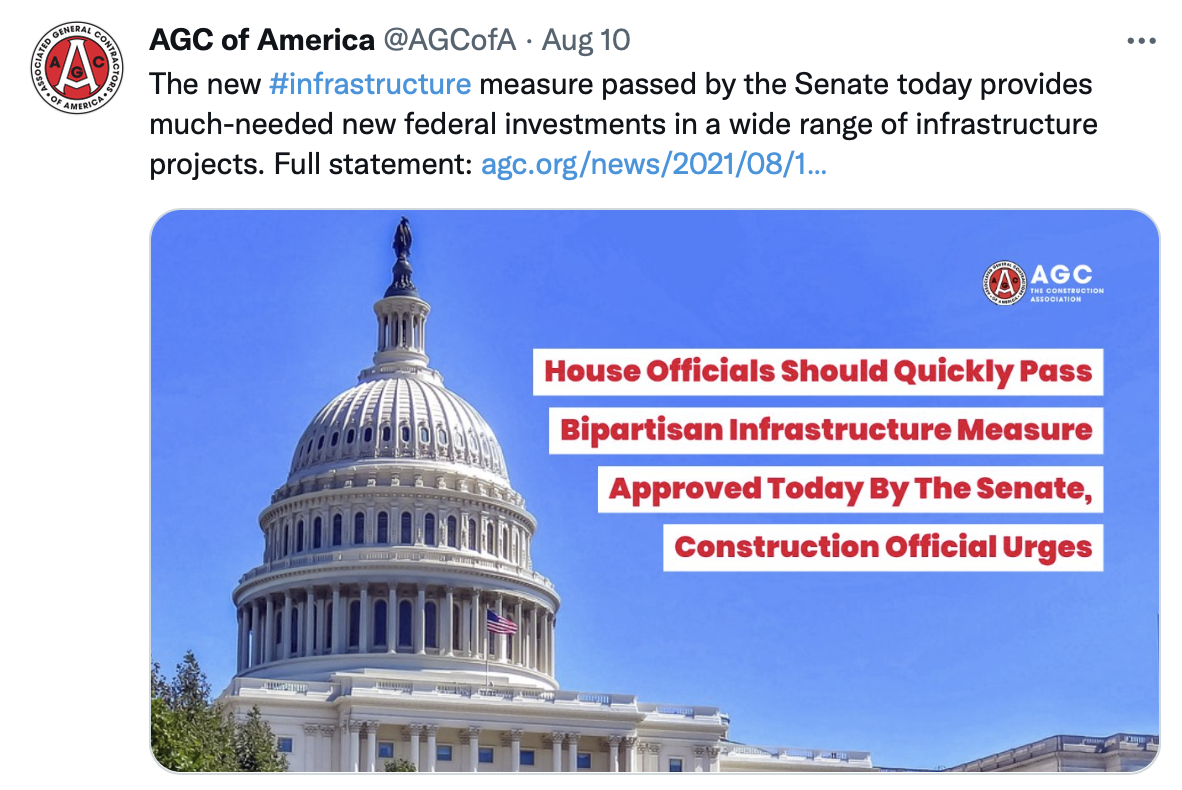
“Infrastructure is foundational to every aspect of our lives and Governors have been leading the call for action to fix now and invest in the future. Take a look at how the Infrastructure Investment and Jobs Act makes a generational investment in America.”
National Governors Association
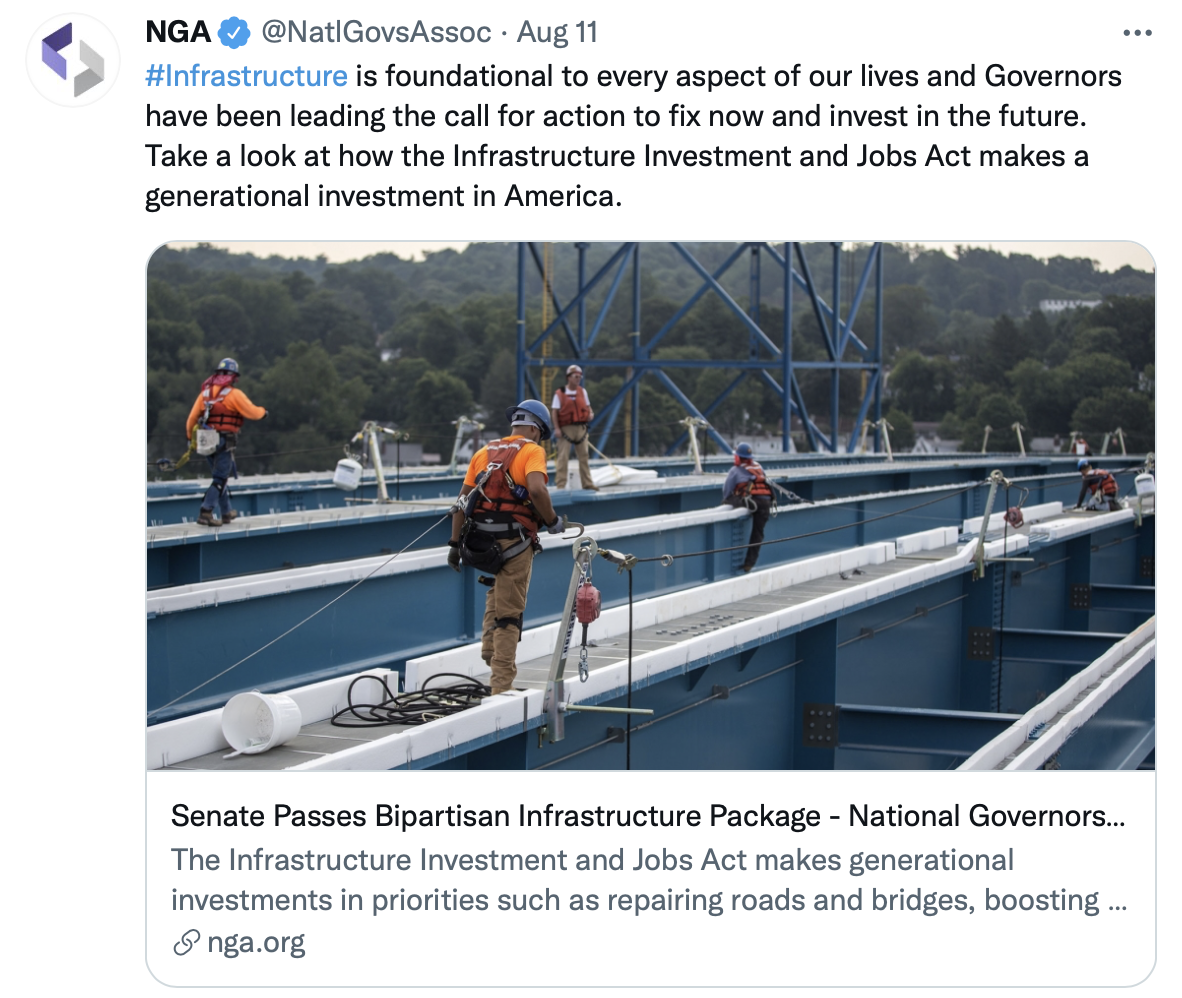
“Most people said it couldn’t be done. But not @SenBillCassidy. The Senate just passed a bipartisan infrastructure bill on a resounding 69-30 vote. Senator Cassidy and our Senate allies got it done. Thank You @SenBillCassidy! It’s a #BIDdeal”
No Labels

“I commend the U.S. Senate for passing the IIJA today and demonstrating the bipartisanship that’s so important for this legislation to pass into law. Infrastructure knows no political boundaries and the IIJA will benefit everybody and all modes of transportation in our state.”
Louisiana Secretary of Transportation and Development Shawn Wilson, Ph.D.
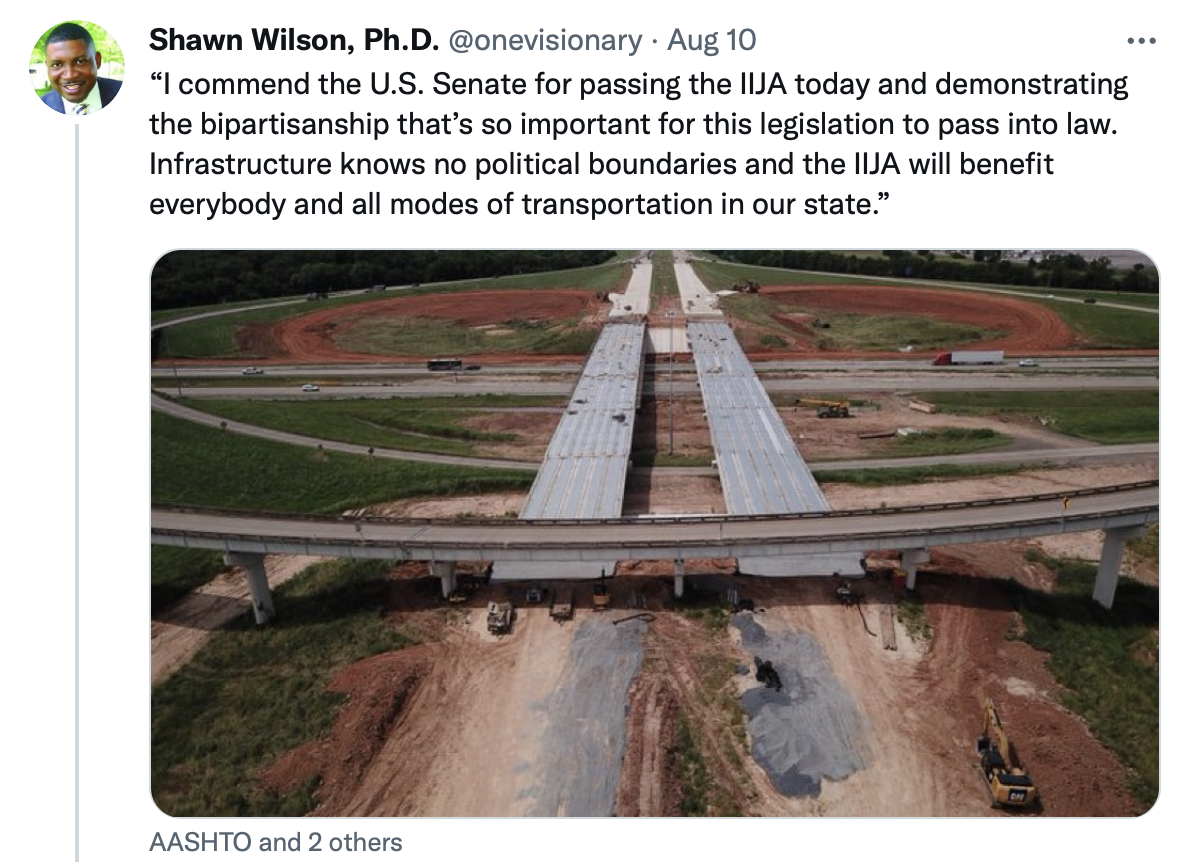
“We are pleased with the Senate’s progress towards passing this bill and look forward to assisting the Administration and States in bringing its benefits to life.”
National Association of Manufactures
“For nearly three decades, our nation and industry have been held hostage by empty promises—all talk, no action. Today, the Senate put America ahead of itself. Passage of this bipartisan infrastructure bill is a groundbreaking step toward revitalizing America’s decaying roads and bridges, supporting our supply chain and economy with the foundation they need to grow, compete globally and lead the world.”
American Trucking Association
“AASHTO is grateful the Senate was able to work in a bipartisan way to pass this historic infrastructure legislation, which provides a robust funding increase for all modes of transportation.”
American Association of State Highway and Transportation Officials
“The strong bipartisan spirit demonstrated in the Senate approval of the Infrastructure Investment & Jobs Act sets the bar high.”
American Road & Transportation Builders Association
“American Trucking Association: “For nearly three decades, our nation and industry have been held hostage by empty promises-all talk, no action. Today, the Senate put America ahead of itself. Passage of this bipartisan infrastructure bill is a groundbreaking step toward revitalizing America’s decaying roads and bridges, supporting our supply chain and economy with the foundation they need to grow, compete globally and lead the world.”
National Cattlemen’s Beef Association
Previous
Next
Other supporters include
Agricultural Retailers Association
Airports Council International North America
American Apparel & Footwear Association
American Concrete Pavement Association
American Concrete Pipe Association
American Concrete Pumping Association
American Consulting Engineers Council
American Council of Engineering Companies
American Council for Capital Formation
American Farm Bureau Federation
American Foundry Society
American Highway Users Alliance
American Institute of Steel Construction
American Iron & Steel Institute
American Public Transportation Association
American Rental Association
American Securities Association
American Society of Civil Engineers
American Society of Landscape Architects
American Subcontractors Association
American Traffic Safety Services Association
Associated Equipment Distributors
Associated Wire Rope Fabricators
Association of American Railroads
Association of Equipment Manufacturers
Auto Care Association
Bipartisan Policy Center
Building America’s Future
Build Together CEO Working Group
Coalition for America’s Gateways & Trade Corridors
Community Transportation Association of American
Computer & Communications Industry Association
Construction & Demolition Recycling Association
Corn Refiners Association
Design-Build Institute of America
Edison Electric Institute
FP2, formerly the Foundation for Pavement Preservation
Independent Electrical Contractors
Independent Lubricant Manufacturers Association
Industrial Minerals Association – North America
Information Technology Industry Council
Institute of Manufacturers of Explosives
Institute of Transportation Engineers
International Association of Iron Workers
International Brotherhood of Teamsters
International Society of Explosive Engineers
International Union of Operating Engineers
Laborers’ International Union of North America
Major Metro Coalition
National Air Traffic Controllers Association (NATCA)
National Asphalt Pavement Association
National Association of Convenience Stores
National Association of Counties
National Association of County Engineers
National Association of Home Builders
National Association of Remodeling Industry
National Association of Surety Bond Producers
National Association of Trailer Manufacturers
National Associations of Truckstop Operators
National Association of Wholesaler-Distributors
National Conference of State Legislatures
National Electrical Contractors Association
National Independent Autodealers Association
National League of Cities
National Lime Association
National Mining Association
National Ready Mixed Concrete Association
National Retail Federation
National Society of Professional Surveyors
National Steel Bridge Alliance
National Stone, Sand, and Gravel Association
National Waste & Recycling Association
North American Association of Food Equipment Manufacturers
North America’s Building Trades Unions
Portland Cement Association
Precast/Prestressed Concrete Institute
Railway Supply Institute
Retail Industry Leaders Association
Sheet Metal and Air Conditioning Contractors National Association
Small Business Roundtable
Society of Independent Gasoline Marketers of America
Specialized Carriers & Rigging Association
Steel Manufacturers Association
Subsurface Utility Engineering Association
TechNet
The Council of State Governments
The Nature Conservancy
The Surety & Fidelity Association of America
Tire Industry Association
Transport Workers Unions of America
Transportation Intermediaries Association
Transportation Trades Department, AFL-CIO
Travel Goods Association
U.S. Conference of Mayors
U.S. Geospatial Executives Organization
U.S. Tire Manufacturers Association
U.S. Travel Association
United Brotherhood of Carpenters and Joiners of America
United Motorcoach Association
